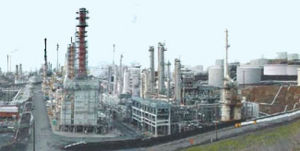Upstream, midstream and downstream (petroleum industry): Difference between revisions
imported>Milton Beychok m (Null space to jog display) |
John Leach (talk | contribs) |
||
| (2 intermediate revisions by one other user not shown) | |||
| Line 12: | Line 12: | ||
== The midstream sector == | == The midstream sector == | ||
The '''midstream''' involves storing, marketing and transporting petroleum crude oil, natural gas, [[natural gas liquids]] (mainly [[ethane]], [[propane]] and [[butane]]) and byproduct [[ | The '''midstream''' involves storing, marketing and transporting petroleum crude oil, natural gas, [[natural gas liquids]] (mainly [[ethane]], [[propane]] and [[butane]]) and byproduct [[sulphur]]. Midstream operations are sometimes included in the downstream category. | ||
== The downstream sector == | == The downstream sector == | ||
| Line 18: | Line 18: | ||
The '''downstream''' sector involves the [[Petroleum refining processes|refining]] of petroleum crude oil and the [[Natural gas processing|processing of raw natural gas]]. It includes the selling and distribution of processed natural gas and the products derived from petroleum crude oil such as [[liquified petroleum gas]] (LPG), [[Gasoline|gasoline]] (or petrol), [[jet fuel]], [[diesel oil]], other [[fuel oil]]s, [[Asphalt (petroleum)|petroleum asphalt]] and [[petroleum coke]]. | The '''downstream''' sector involves the [[Petroleum refining processes|refining]] of petroleum crude oil and the [[Natural gas processing|processing of raw natural gas]]. It includes the selling and distribution of processed natural gas and the products derived from petroleum crude oil such as [[liquified petroleum gas]] (LPG), [[Gasoline|gasoline]] (or petrol), [[jet fuel]], [[diesel oil]], other [[fuel oil]]s, [[Asphalt (petroleum)|petroleum asphalt]] and [[petroleum coke]]. | ||
The downstream sector includes [[Petroleum refining processes|petroleum refineries]],<ref>{{cite book|author=Gary, J.H. and Handwerk, G.E.|title=Petroleum Refining Technology and Economics|edition=2nd Edition|publisher=Marcel Dekker, Inc|year=1984| | The downstream sector includes [[Petroleum refining processes|petroleum refineries]],<ref>{{cite book|author=Gary, J.H. and Handwerk, G.E.|title=Petroleum Refining Technology and Economics|edition=2nd Edition|publisher=Marcel Dekker, Inc|year=1984|id=ISBN 0-8247-7150-8}}</ref> petroleum product distribution, retail outlets and natural gas distribution companies. | ||
=== Byproduct | === Byproduct sulfur === | ||
Petroleum crude oil is a mixture of hundreds of [[hydrocarbon]]s, many of which contain sulfur that is removed during the refining of the crude oil. Raw natural gas also has sulfur-containing compounds, which are removed in processing of the raw natural gas before it is distributed to consumers. The sulfur-containing compounds removed in the refining and processing of petroleum crude oil and raw natural gas are subsequently converted into byproduct elemental sulfur. The production and marketing of the byproduct sulfur is considered to be part of the downstream sector. | Petroleum crude oil is a mixture of hundreds of [[hydrocarbon]]s, many of which contain sulfur that is removed during the refining of the crude oil. Raw natural gas also has sulfur-containing compounds, which are removed in processing of the raw natural gas before it is distributed to consumers. The sulfur-containing compounds removed in the refining and processing of petroleum crude oil and raw natural gas are subsequently converted into byproduct elemental sulfur. The production and marketing of the byproduct sulfur is considered to be part of the downstream sector. | ||
Revision as of 08:16, 6 March 2024
The terms upstream, midstream and downstream are often used to refer to the major sectors or operational components of the petroleum industry.
The upstream sector
The upstream sector involves the exploration for and extraction of petroleum crude oil and natural gas. The upstream oil sector is also known as the exploration and production (E&P) sector.
The upstream sector includes the searching for potential underground or underwater oil and gas fields, drilling of exploratory wells, and subsequently operating the wells that recover and bring the petroleum crude oil and/or raw natural gas to the surface.
The midstream sector
The midstream involves storing, marketing and transporting petroleum crude oil, natural gas, natural gas liquids (mainly ethane, propane and butane) and byproduct sulphur. Midstream operations are sometimes included in the downstream category.
The downstream sector
The downstream sector involves the refining of petroleum crude oil and the processing of raw natural gas. It includes the selling and distribution of processed natural gas and the products derived from petroleum crude oil such as liquified petroleum gas (LPG), gasoline (or petrol), jet fuel, diesel oil, other fuel oils, petroleum asphalt and petroleum coke.
The downstream sector includes petroleum refineries,[1] petroleum product distribution, retail outlets and natural gas distribution companies.
Byproduct sulfur
Petroleum crude oil is a mixture of hundreds of hydrocarbons, many of which contain sulfur that is removed during the refining of the crude oil. Raw natural gas also has sulfur-containing compounds, which are removed in processing of the raw natural gas before it is distributed to consumers. The sulfur-containing compounds removed in the refining and processing of petroleum crude oil and raw natural gas are subsequently converted into byproduct elemental sulfur. The production and marketing of the byproduct sulfur is considered to be part of the downstream sector.
The vast majority of the 64,000,000 metric tons of sulfur produced worldwide in 2005 was byproduct sulphur from refineries and natural gas processing plants.[2]
Petrochemical industry
The petrochemical industry is not generally considered to be a part of the petroleum industry. However, it is sometimes listed as a part of the downstream sector and sometimes as a fourth sector of the petroleum industry.
References
- ↑ Gary, J.H. and Handwerk, G.E. (1984). Petroleum Refining Technology and Economics, 2nd Edition. Marcel Dekker, Inc. ISBN 0-8247-7150-8.
- ↑ Sulfur production report by the United States Geological Survey
